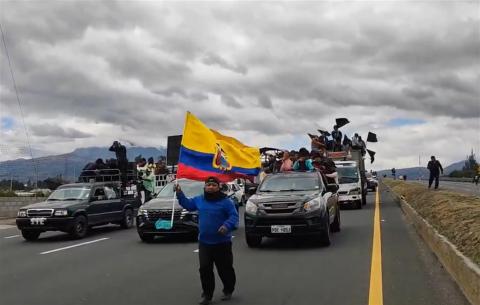


Sections of highways in at least three provinces of Ecuador registered blockades today as part of the nationwide strike promoted by the indigenous movement, now in its 16th day, against the elimination of the diesel subsidy.
The Integrated Security Service (ECU 911) reported blockades in Imbabura, Pichincha, and Chimborazo.
The Confederation of Indigenous Nationalities of Ecuador (Conaie) denounced this Tuesday that armored vehicles and members of the Armed Forces were deployed in the canton of Tambo, Cañar province, where the presence of military personnel intensified hours before President Daniel Noboa's arrival in the area.
Residents of that community took to the streets with flags, signs, and slogans rejecting the president's policies, led by the Kañari people, and public forces responded with tear gas, Conaie stated.
Furthermore, local media report that a caravan is advancing along the Pan-American Highway E35 toward Latacunga, Cotopaxi province.
Ecuador is in the sixteenth day of the strike called by Conaie, which demands that the government reinstate the diesel subsidy, reduce the Value Added Tax (VAT) to 12 percent, provide state attention to health, education, and security, and release those detained.
Ecuador's Minister of Government, Zaida Rovira, stated yesterday that there is an openness to dialogue with social organizations but ruled out including in the negotiation points the repeal of Decree 126, which eliminated the diesel subsidy, and the reduction of VAT.
Rovira rejected statements from Conaie president, Marlon Vargas, about a potential "takeover of Quito" due to the government's lack of response to the issues that have sparked the protests.
"We will not relent in our position regarding allowing the country to be set on fire; we will be very firm on that, dialogue with all who want to talk, but with those who want to continue sowing chaos and terror, we will be very firm," the minister said. For his part, Vargas clarified on Monday that the demonstrations promoted by the organization do not seek to attack cities, but to make visible years of neglect, poverty, and inequality in their communities.
The leader, whom the ruling party has reported to the Prosecutor's Office for the alleged crime of terrorism, stated on his X social media account that the struggle is "for life, justice, and peace, not for violence."
For this Tuesday, the Pueblo Kitu Kara called for a general plurinational and popular mobilization in this capital to confront a government they label as "warmongering, intransigent, and repressive," and which, they claim, follows the agenda of the International Monetary Fund and the elites with whom it governs.
The government maintains that the economic measures are necessary and insists it will not reverse the decision on diesel, nor is it willing to dialogue with "a minority" that does not represent the country.